HVAC Companies Four Marks
Find Air Conditioning Services in Four Marks
Receive 3 FREE HVAC Contractor quotes for your project today! Compare profiles, reviews, accreditations, portfolio, etc... and choose the best offer.

Devine Distribution Ltd - Kitchen Appliances Waterlooville
4.935 reviewsUnit 23 Aston Road, Waterlooville, PO7 7XJ, GBDevine Distribution is the sole UK importer of the acclaimed, European-standard Airforce range of cooker hoods and induction hobs. We bring the same level of enthusiasm and commitment to everything we do, whether supplying a single cooker hood online or designing and installing an entire kitchen. Our extensive and secure e-commerce shop allows you to explore products, technical manuals, and utilize our online chat for assistance. Our showroom, 'Back to the Kitchen', showcases a large number of kitchen displays and a broad selection of Airforce hoods and induction hobs. We handle design, supply, and installation, including building works. Our 7,000 square foot warehouse ensures fast delivery, and our manufacturing facility creates bespoke cabinetry for individually-styled kitchens. We work with trade customers, including kitchen showrooms, design studios, builders, and developers. We partner with ArtiCAD, and our full Airforce range is available as a comprehensive graphics catalogue within their software. Designers can select the perfect product for their clients, and we provide support with technical details or complete installation if needed.
- Services
- Why Us?
- Accreditations
- Gallery
Get Quote
Trane UK Ltd
3.67 reviewsBasingstoke, GBTrane is a leading global provider of indoor comfort solutions and services. Our innovative products and services help buildings and processes work more efficiently, sustainably, and effectively. With a portfolio of energy-efficient HVAC systems, rental solutions, and services, we help customers achieve their goals and reduce their environmental impact. Our solutions are designed to meet the unique needs of various industries, including office buildings, data centers, healthcare, hospitality, chemicals and pharmaceuticals, retail, food and beverage, and district heating and cooling.
- Services
- Why Us?
- Gallery
Get Quote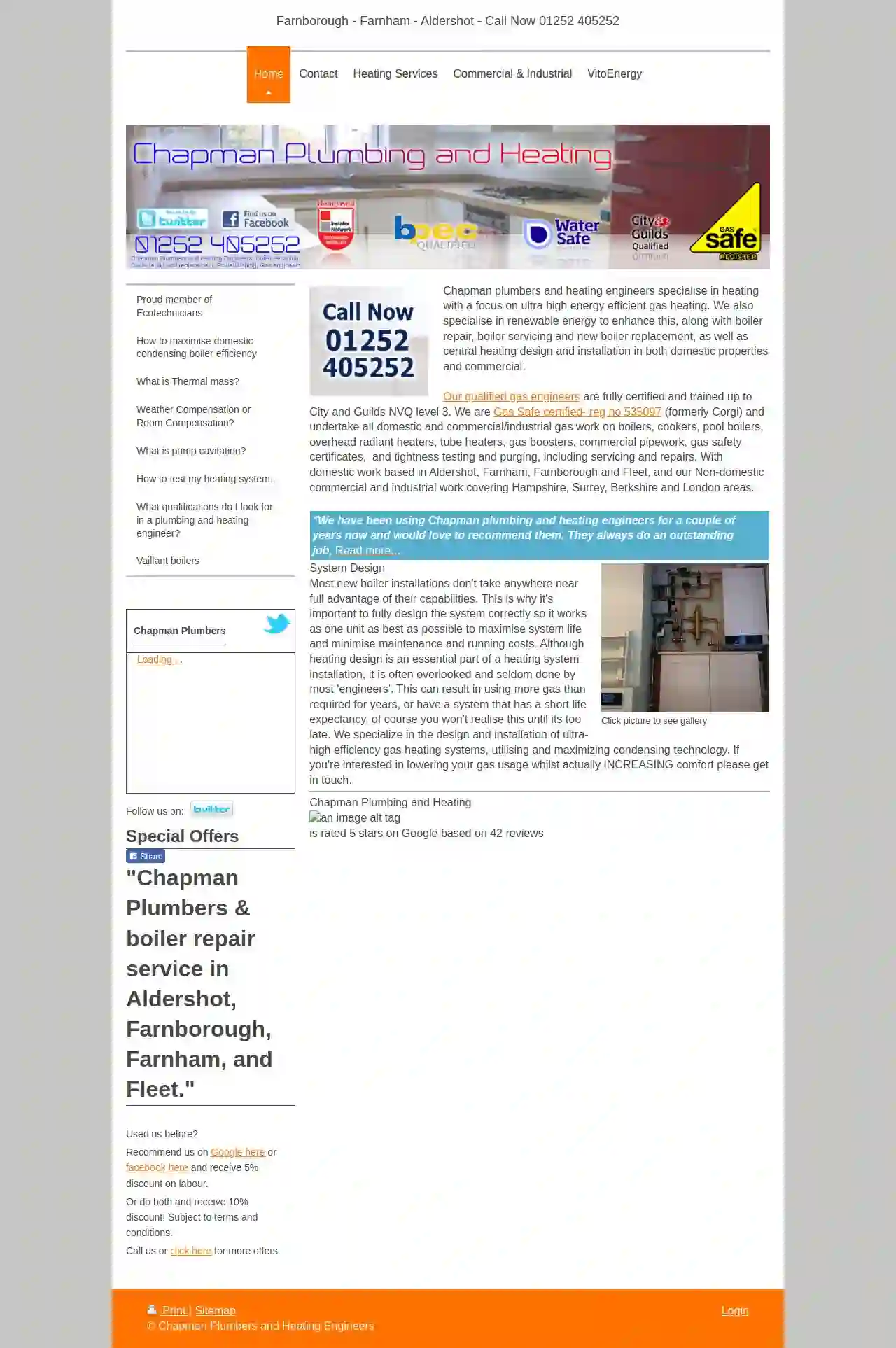
Chapman Plumbing and Heating
551 reviewsAldershot, GU12, GBChapman Plumbers and Heating Engineers specialise in heating with a focus on ultra high energy efficient gas heating. We also specialise in renewable energy to enhance this, along with boiler repair, boiler servicing and new boiler replacement, as well as central heating design and installation in both domestic properties and commercial. Our qualified gas engineers are fully certified and trained up to City and Guilds NVQ level 3. We are Gas Safe certified- reg no 535097 (formerly Corgi) and undertake all domestic and commercial/industrial gas work on boilers, cookers, pool boilers, overhead radiant heaters, tube heaters, gas boosters, commercial pipework, gas safety certificates, and tightness testing and purging, including servicing and repairs. With domestic work based in Aldershot, Farnham, Farnborough and Fleet, and our Non-domestic commercial and industrial work covering Hampshire, Surrey, Berkshire and London areas.
- Services
- Why Us?
- Accreditations
- Our Team
- Testimonials
- Gallery
Get Quote
Gas-Fix
4.932 reviewsNorth Lane, Clanfield, Unit 2Blagden Farm, PO8 0QB, GBGas-Fix is a local business based in Waterlooville, Hampshire, serving the south coast of the UK. Founded by two former British Gas trained engineers with over 25 years of experience in gas central heating, gas appliances, and power flushing, Gas-Fix offers a comprehensive range of services. From fault finding and repairs to servicing and upgrading your central heating system, they aim to provide suitable options to match all budgets. They only fit boilers from reputable manufacturers with a proven reliability record. All engineers are Gas Safe registered and carry their official ID cards for your inspection. Gas-Fix is a proud member of Check-a-Trade and boasts a 9.9 out of 10 customer rating. As a Worcester Accredited Installer, they meet the high standards of installation, service, and customer care set by Worcester Bosch. They specialize in Worcester installations and offer exclusive benefits to homeowners.
- Services
- Why Us?
- Accreditations
- Gallery
Get Quote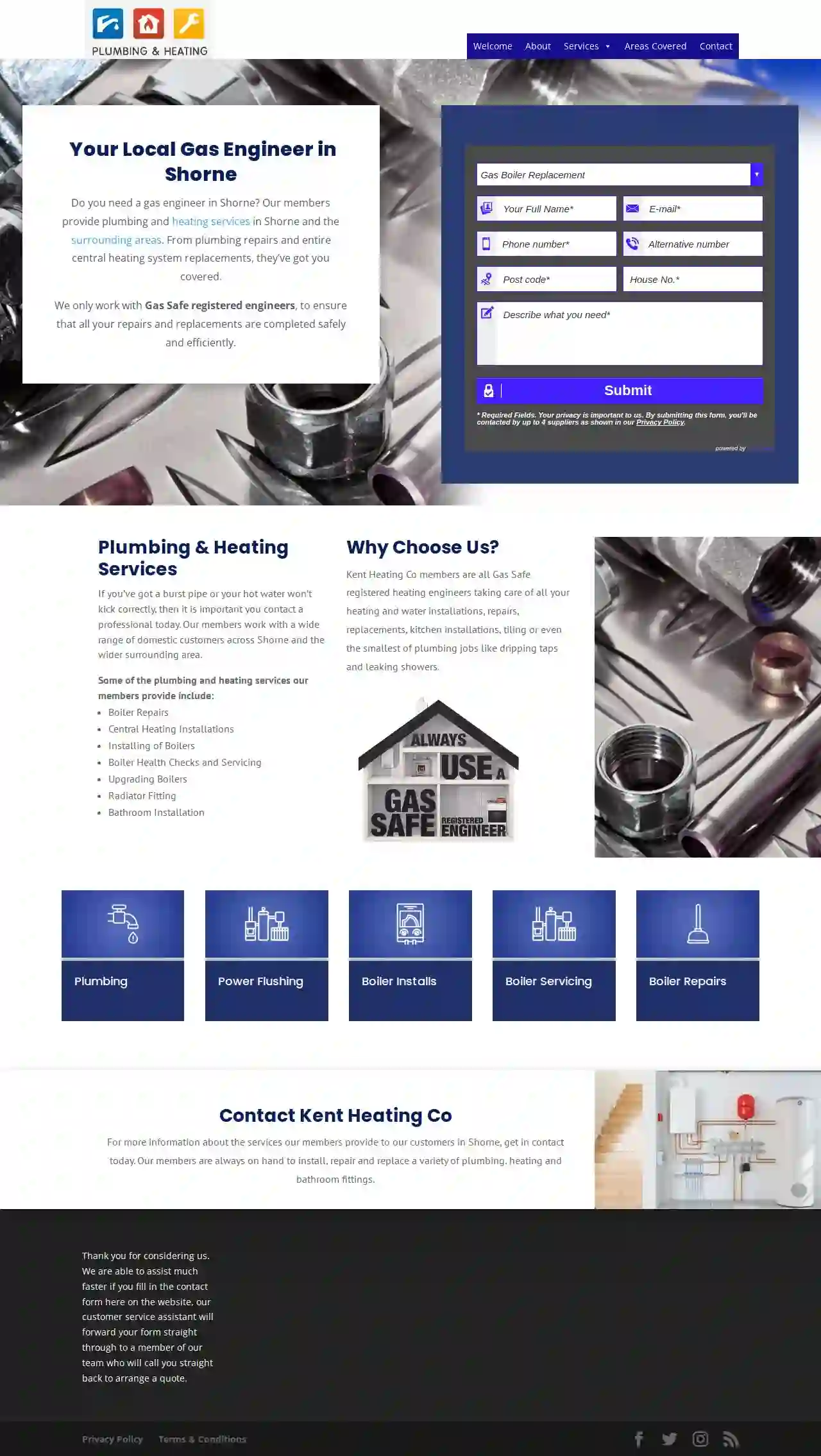
AOC Plumbing & Heating Services
51 reviewsShorne, High Street, Unit 1, The Business Centre, ME9 7AA, GBKent Heating Co is a network of Gas Safe registered heating engineers serving Kent and the surrounding areas. They offer a comprehensive range of plumbing and heating services, from small repairs like dripping taps to large installations like central heating systems. Their team of experienced engineers ensures all work is completed safely and efficiently. Whether you need a boiler repair, installation, or servicing, Kent Heating Co has you covered. They also provide power flushing, smart thermostat installation, and bathroom installations. For a prompt and reliable service, contact Kent Heating Co today.
- Services
- Why Us?
- Gallery
Get Quote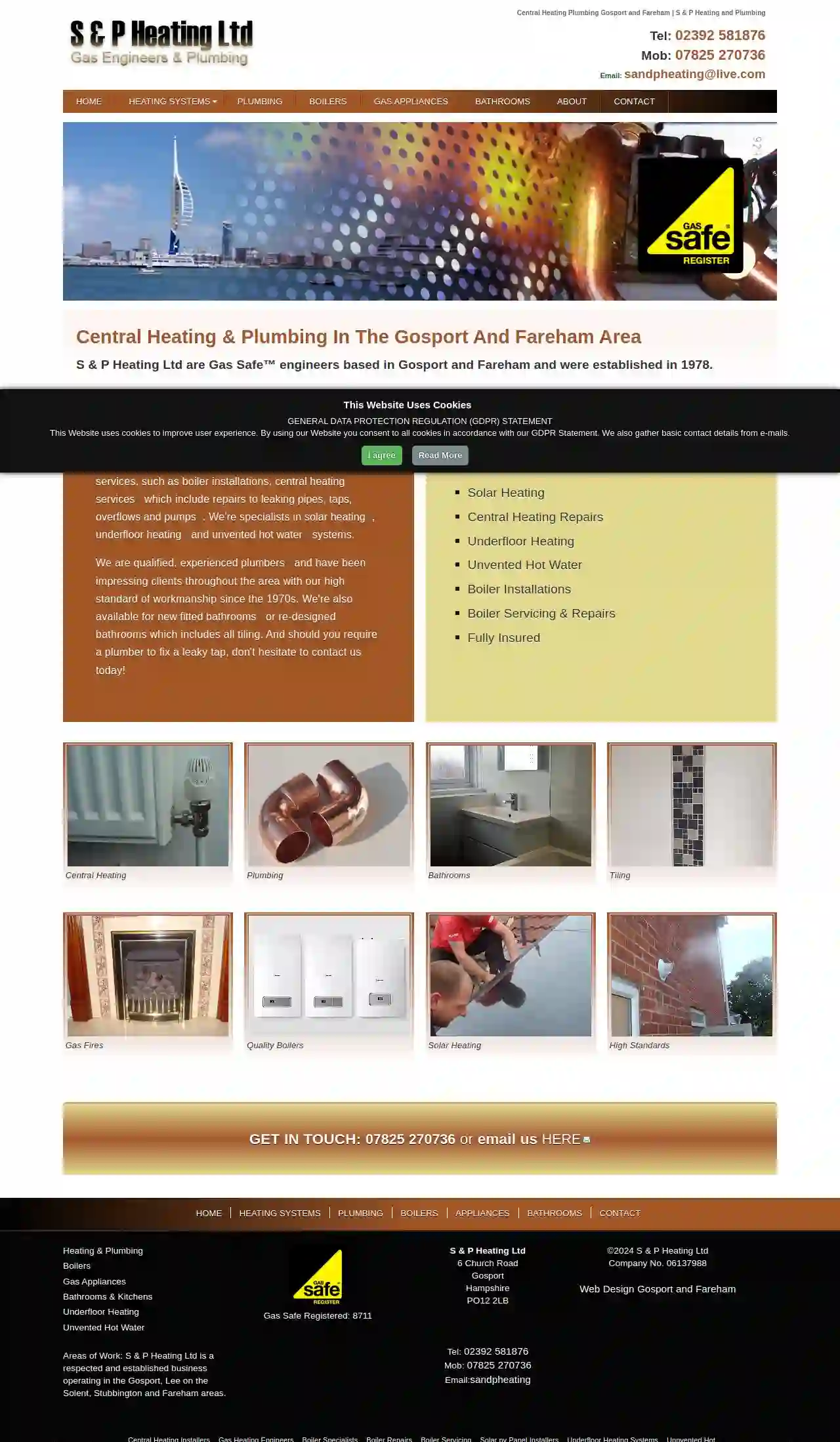
S & P Heating Ltd
6 Church Road, Gosport, PO12 2LB, GBS & P Heating Ltd are Gas Safe™ engineers based in Gosport and Fareham and were established in 1978. S & P Heating Ltd is a Gosport and Fareham based plumbing and heating company, which offers gas services, such as boiler installations, central heating services which include repairs to leaking pipes, taps, overflows and pumps. We're specialists in solar heating, underfloor heating and unvented hot water systems. We are qualified, experienced plumbers and have been impressing clients throughout the area with our high standard of workmanship since the 1970s. We're also available for new fitted bathrooms or re-designed bathrooms which includes all tiling. And should you require a plumber to fix a leaky tap, don't hesitate to contact us today!
- Services
- Why Us?
- Accreditations
- Gallery
Get Quote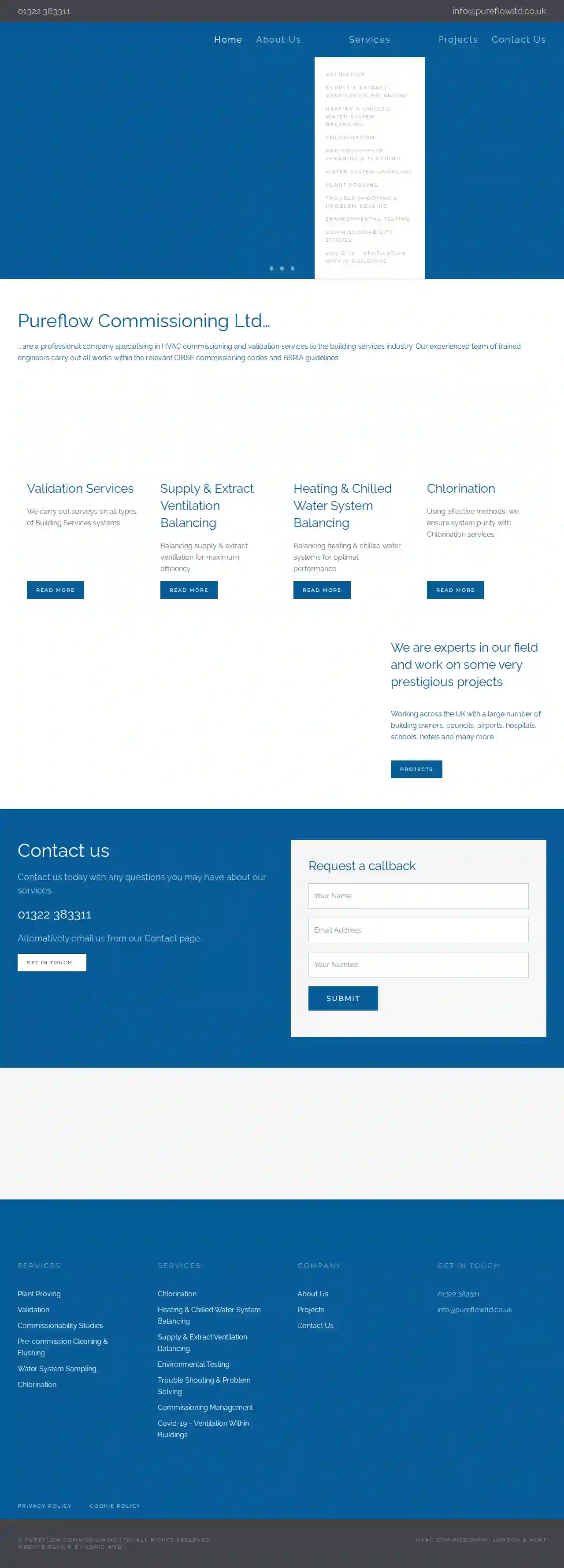
Pureflow Commissioning Ltd
17 London Road, Swanscombe, Unit 7, Swanscombe Business Centre, DA10 0LH, GBPureflow Commissioning Ltd. is a specialist HVAC commissioning and validation company serving the building services industry. We offer a comprehensive range of services, including plant proving, commissioning management, and environmental testing. Our team of experienced engineers is dedicated to ensuring that your HVAC systems are installed, commissioned, and validated to the highest standards.
- Services
- Why Us?
- Accreditations
- Gallery
Get Quote
All About Gas Heating & Plumbing Services
4.531 reviews25a South Street, Havant, PO9 1BU, GBAll About Gas is a well established reputable and trustworthy company with over thirty five years experience in the gas heating and plumbing industries. Working in both domestic and commercial premises, we cover a wide range of aspects to suit clients requirements. Over the years of hard work our company has become accredited with Manufacturers Worcester Bosch, Vaillant and endorsed by Which Trusted Traders. Our main line of business is response boiler repairs, hot water and central heating repairs, new boiler installations and general maintenance of all gas appliances. We also specialise in boiler de-scaling and full heating system power flushing.
- Services
- Why Us?
- Accreditations
- Testimonials
- Gallery
Get Quote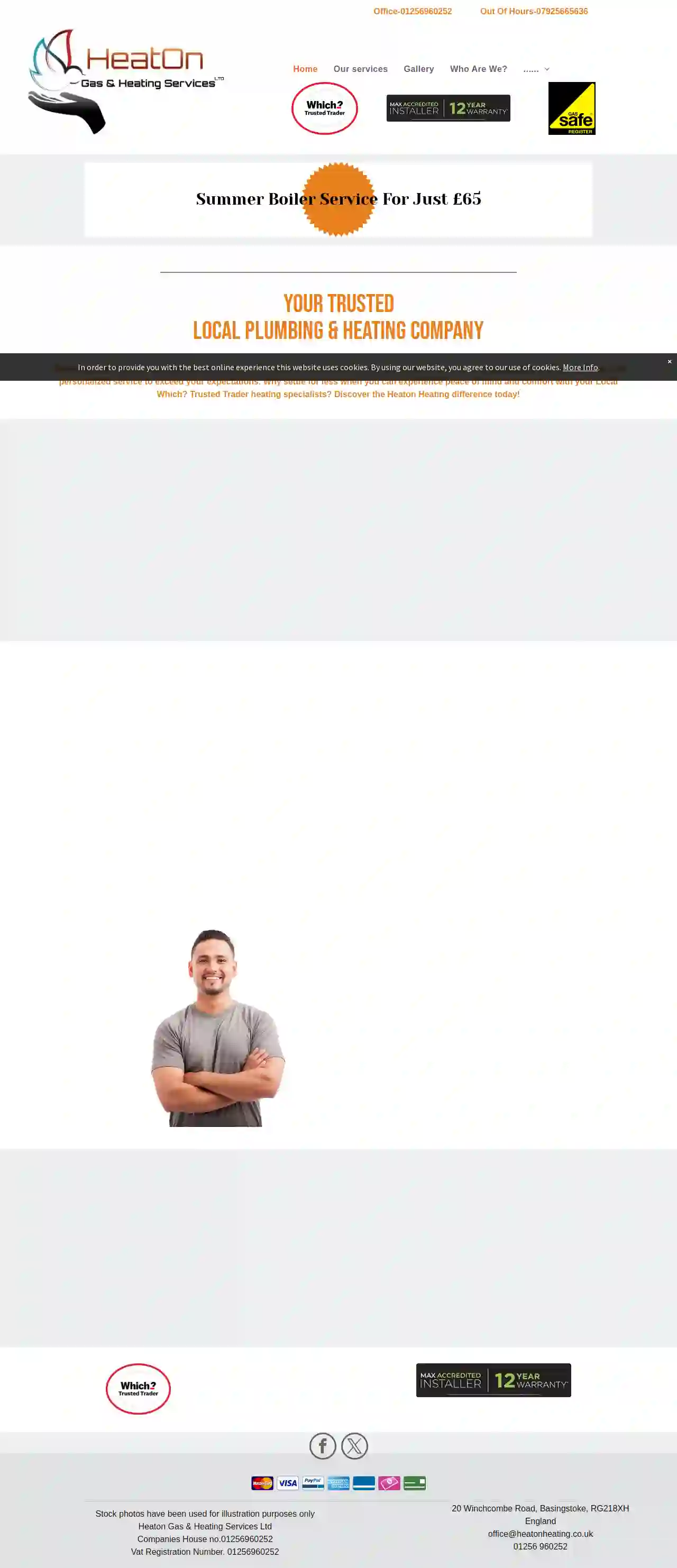
HeatOn Gas & Heating Services Ltd
53 reviews20 Winchcombe Rd, Basingstoke, RG21 8XH, GBWelcome to HeatOn Gas and Heating Services, your trusted partner for all gas and heating needs in Basingstoke and surrounding areas. Our team of certified technicians is dedicated to delivering high-quality installations, repairs, and maintenance to ensure your home's warmth and efficiency. Contact us today to learn more about how we can help keep your heating system running smoothly. At HeatOn Gas and Heating Services, we are committed to providing top-notch heating services to meet all your needs. Our comprehensive range of services ensures that whether you need a new boiler installation, routine maintenance, or emergency repairs, our expert team is here to help. We take pride in our work, offering reliable and efficient solutions tailored to your specific requirements. Why Choose HeatOn Gas and Heating Services? Customer-Centric Approach: We prioritise your needs and work diligently to exceed your expectations. Expert Technicians: Our team is highly skilled and experienced in all aspects of gas and heating services. Comprehensive Services: From installation to maintenance, we offer a full range of heating solutions. Quality Assurance: We use only the highest quality materials and latest techniques to ensure your satisfaction. Reach Out to us Don't wait any longer to experience top-quality heating services. Reach out to HeatOn Gas and Heating Services now and let our expert team ensure your home stays warm and efficient all year round.
- Services
- Why Us?
- Testimonials
- Gallery
Get Quote
NJP Heating Services Ltd
560 reviews14 Matthews Way, Oakley, Basingstoke, Hampshire, GBWelcome to NJP Heating Services Ltd, a Gas Safe Registered domestic central heating and plumbing company based in Oakley, Hampshire. We serve local customers in Basingstoke and surrounding areas, including Alton, Kingsclere, Overton, Whitchurch, Hook, Tadley, Odiham and Hartley Wintney. Established in 2004, we are a family run business that focuses on service and reliability, and we are always happy to provide free estimates in advance of commencing any work for you. As Worcester Bosch Accredited Installers, we offer up to 10 year parts and labour guarantees on all Worcester Bosch boiler installations and accessories. We provide Boiler Servicing and can Power Flush Heating Systems. Our team is led by Nick Prickett, Director, and we are proud to be accredited installers of high quality products from Worcester Bosch, which have received the Which? Best Buy Award 9 years running across their entire boiler range for ‘Most Reliable Boilers’ & ‘Most Satisfied Customers’.
- Services
- Why Us?
- Accreditations
- Our Team
- Testimonials
- Gallery
Get Quote
Over 12,692+ HVAC Contractors on our platform
Our HVAC contractors operate in Four Marks and beyond!
HVACCompaniesHub has curated and vetted Top HVAC Contractors in and around Four Marks. Find a top & reliable contractor today.
Frequently Asked Questions About HVAC Companies
- Your home's square footage
- Your local climate
- Insulation levels
- Window efficiency
- Number of occupants
- Check Online Reviews: Look for HVAC companies with positive reviews and high ratings on platforms like Google, Yelp, and others.
- Ask for Referrals: Reach out to friends, family, neighbors, or colleagues for recommendations.
- Verify Licensing and Insurance: Ensure the company is properly licensed and insured to operate in your area.
- Look for Certifications: Check for certifications from reputable organizations like NATE (North American Technician Excellence).
- Compare Quotes: Get quotes from multiple HVAC companies to compare pricing and services.
- Use a Directory like HVACCompaniesHub: Simplify your search by using our directory of pre-screened and qualified HVAC professionals.
- Climate: Heat pumps are generally more efficient in moderate climates, while furnaces are better for colder regions.
- Budget: The upfront cost of different systems can vary significantly.
- Energy Efficiency Goals: Higher-efficiency systems are usually more expensive upfront but result in lower energy bills over time.
- Home Size and Layout: The square footage and layout of your home affect the system's capacity and ductwork requirements.
- Existing Ductwork: If you have existing ductwork, you'll need a system compatible with it.
What is a SEER rating, and why is it important?
How do I choose the right size AC unit for my home?
How do I find a good HVAC company near me?
Finding a reputable HVAC company requires research. Consider these tips:
What type of HVAC system is best for my home?
What is a SEER rating, and why is it important?
How do I choose the right size AC unit for my home?
- Your home's square footage
- Your local climate
- Insulation levels
- Window efficiency
- Number of occupants
How do I find a good HVAC company near me?
Finding a reputable HVAC company requires research. Consider these tips:
- Check Online Reviews: Look for HVAC companies with positive reviews and high ratings on platforms like Google, Yelp, and others.
- Ask for Referrals: Reach out to friends, family, neighbors, or colleagues for recommendations.
- Verify Licensing and Insurance: Ensure the company is properly licensed and insured to operate in your area.
- Look for Certifications: Check for certifications from reputable organizations like NATE (North American Technician Excellence).
- Compare Quotes: Get quotes from multiple HVAC companies to compare pricing and services.
- Use a Directory like HVACCompaniesHub: Simplify your search by using our directory of pre-screened and qualified HVAC professionals.
What type of HVAC system is best for my home?
- Climate: Heat pumps are generally more efficient in moderate climates, while furnaces are better for colder regions.
- Budget: The upfront cost of different systems can vary significantly.
- Energy Efficiency Goals: Higher-efficiency systems are usually more expensive upfront but result in lower energy bills over time.
- Home Size and Layout: The square footage and layout of your home affect the system's capacity and ductwork requirements.
- Existing Ductwork: If you have existing ductwork, you'll need a system compatible with it.